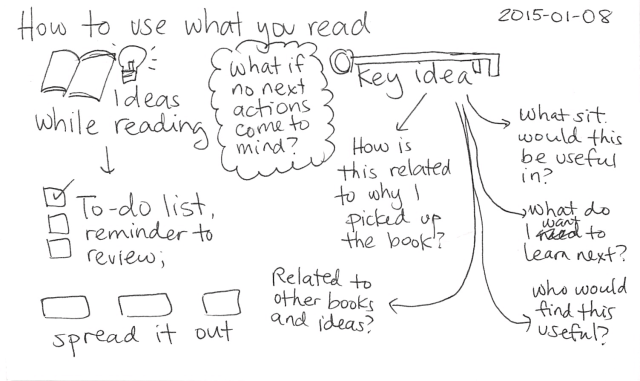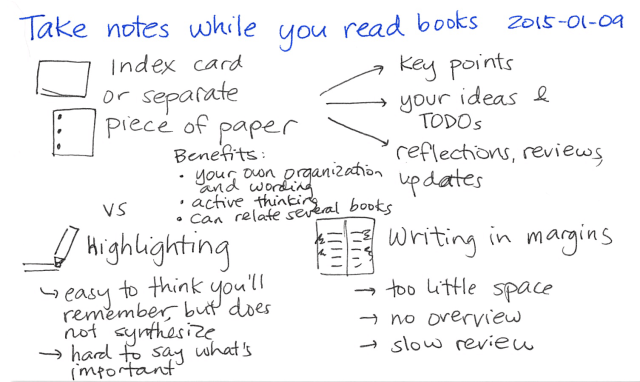I read widely and voraciously. Every month, I check the list of new releases at the library and request the titles that interest me. From time to time, I'll pull other books off the shelves. When I have a new research interest, I borrow 7-10 books about it. Most of the time, I skim tables of contents and jump to the specific chapters I'm interested in. Few books deserve a close reading and lots of notes. For example, out of the twenty-seven books I lugged home a few weeks ago, I took notes on three:
- Too Much to Know: Managing Scholarly Information Before the Modern Age (Ann M. Blair, 2011: Yale)
- Loved the historical notes on note-taking, indices, and other good things. Learned a lot from this. Very geeky, though.
- Epictetus: Discourses and Selected Writings (trans. and ed. by Robert Dobbin, 2008: Penguin)
- Interested in Stoic philosophy.
- Give and Take: A Revolutionary Approach to Success (Adam Grant, 2013: Viking)
- Research validation for strategy of giving; role models to look up and learn more about? (ex: Rifkin)
I was thinking about why I read a lot of books and when it might make sense to adopt a different strategy. One of the nuggets I picked up from Too Much to Know was this viewpoint from Seneca:
Instead Seneca recommended focusing on a limited number of good books to be read thoroughly and repeatedly: “You should always read the standard authors; and when you crave change, fall back upon those whom you read before.”
– Too Much to Know: Managing Scholarly Information Before the Modern Age (Ann M. Blair, 2011: Yale)
Restricting myself to a small canon feels slightly claustrophobic, but I can see the point of rereading, absorbing, enacting, experimenting, digging deeper. After all, the limiting factor is rarely knowledge. More often, our growth is limited by action and reflection. For personal growth, it's not a matter of reading more books — although sometimes the right book can unlock some more understanding through a different perspective. I still like the way that reading lots of different books leads to interesting connections between diverse ideas, though, so I don't think I'll quite give that up. Maybe I'll just reread particularly good books (or at least my notes of books!) more often, as I set up, go through, and review exercises and experiments associated with them.
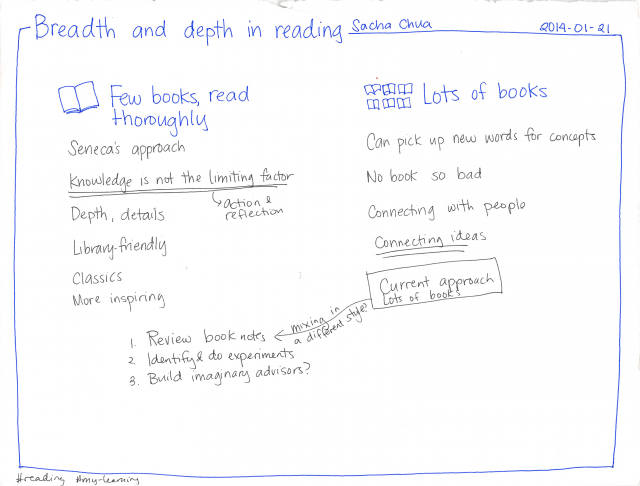
Breadth and depth in reading
Why do I read books, anyway? What do I get out of them? If I'm clearer about what I value, then maybe I can get better at choosing promising books, and also at understanding how I feel about various books. I had been looking forward to reading this social media book for a while, but I found myself a little disappointed in it. It was thorough and probably very useful, but it felt… dry. Another book was vibrant with stories, but didn't translate into actions I was moved to take. Why do I read? What resonates with me?
I started by writing down different reasons, and then I ranked them in terms of importance. The results surprised me.
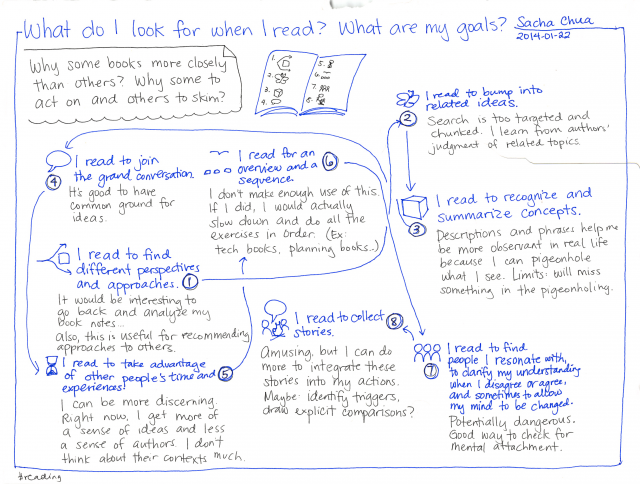
What do I look for when I read? – What are my goals?
It turns out that I read primarily to find different approaches that I can consider or try out. This probably explains why books that proclaim the One True Method rub me the wrong way. I prefer books that lay out several strategies and describe the situations where each strategy may be more appropriate. I can use those strategies myself, and I can also pick up ideas to share with others. I can still read single-strategy books, but I have to do more of the comparison myself, and there's always the suspicion of confirmation bias and cherry-picked stories.
On a related note, I like the way that books present a collection of ideas. When I search for information on the Net, I often end up with a zoomed-in view and little context. It's understandable. That's how I write on my own website – in disconnected chunks. With a well-structured book, I can learn from the related ideas that the authors include. That said, I prefer it if the authors actually worked on figuring out logical connections instead of throwing everything together in a grab-bag of miscellany.
Books are also handy for chunking ideas in a mental shorthand. For example, having read Taleb's book, I can use the “black swan” as a mental shortcut for thinking about the certainty of unpredictable events. Reading books about communication makes it easier for me to see patterns and work with them. The danger is that I might oversimplify, smooshing real-life observations into these neat pigeonholes – but it's probably better than not knowing what to even look for.
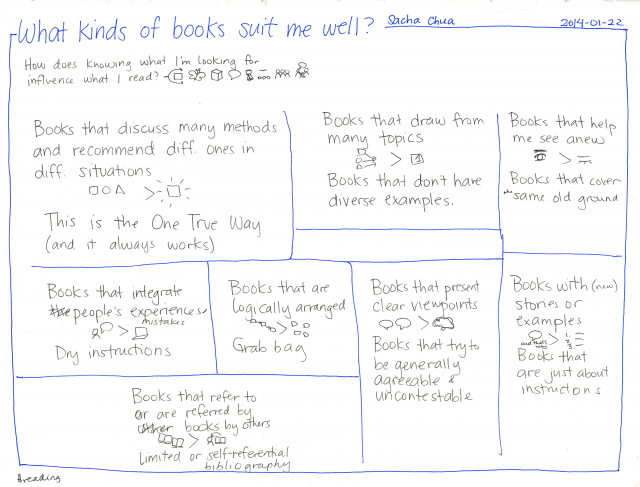
What kinds of books suit me well?
There are probably books that suit me better and others that suit me less. I can't tell all these things from the titles and I refuse to be limited to bestseller recommendations, but I can get a sense of what a book is like from a quick read of a chapter. I'll still read books outside this model once in a while, but it's nice to know why some books end up dogeared and others skimmed.
As for closer, repeated reading, I think it comes down to being moved to action, identifying the triggers for change and the new actions I want to take, keeping notes on the experiment, and circling back to the book to check my observations against the author's notes. There's also this idea of not just being driven by my own questions (since I'm still learning how to ask good questions myself), but to very very carefully pick good teachers and sit at their feet (virtually, of course). Epictetus comes highly recommended throughout the ages, so he might be a good one to start with.
I've been reading all my life, and there's still so much more to learn. =)

